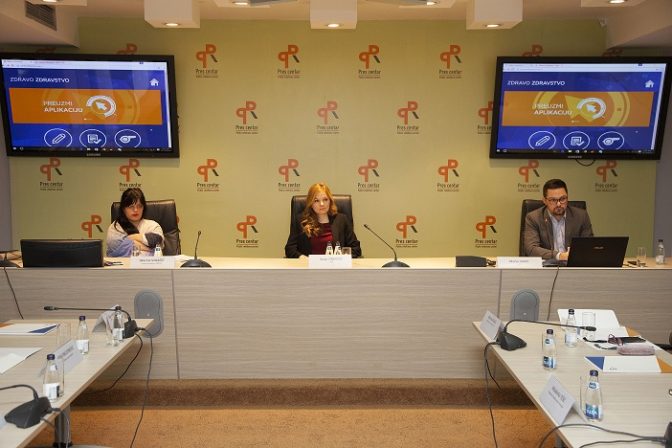Centre for Monitoring and Research (CeMI) presented a mobile and web application that will allow citizens to anonymously report cases of corruption in the healthcare system of Montenegro.
The application was presented within the project “Healthcare System and Patients’ Rights in Montenegro – Winning citizens’ confidence”, funded by the European Union by means of Delegation of the European Union to Montenegro, through European Instrument for Democracy and Human Rights (EIDHR) and Support Program for Montenegro (CBSS).
Project coordinator in CeMI, Marko Savic, said that is it a first mobile application of such kind in Montenegro that allows citizens to anonymously report cases of corruption, with possibility of attaching photos, audio records and similar evidences of alleged cases of violation of their rights as patients.
“Main goal of collecting claims from citizens is to measure the level of corruption in Montenegrin healthcare system, and to determine exact institutions, health sectors and/or doctors/healthcare workers that are corrupted, but also to raise awareness to healthcare workers and citizens about negative consequences of such actions”, said Savic in PR Centre.
This application may allow managers and directors of healthcare institutions to take adequate measures in order to sanction or punish healthcare workers to whom claims refer, based on statements, comments and claims of citizens.
Savic reminded that CeMI has hired a lawyer in September who is providing free legal aid to citizens whose right as a patient was violated.
“Primary legal aid has been provided for 21 patients and secondary legal aid for 9 of them so far. The most significant parts of the report that we receive from the lawyer are that ombudsmen usually don’t respond to a complaint in a legal deadline that is 3 days from the day the complaint was submitted by a patient”, said Savic.
Project coordinator in CeMI, Sanja Zindovic, said that this project is realized by CeMI in cooperation with Association of Youth with Disabilities of Montenegro (UMHCG), Centre for Consumers’ Protection (CEZAP), Centre for Investigative Journalism (CIN) and Lawyers’ Committee for Human Rights (YUCOM).
“The project aims to contribute to reaching EU Standards in Montenegro in the field of protection of human rights as patients and to contribute to equal access to all healthcare services and justice for all citizens, especially to members of marginalized groups”, Zindovic stated.
CeMI aims to encourage full implementation of legislative solutions in the field of healthcare protection through its activities and to give recommendations for their further improvement, by getting closer to international standards in this field, which is the main goal of the project.
“Also, part of activities is directed towards raising awareness of public, civil sector and healthcare services providers, about patients’ rights, with an accent on anti-discrimination, equal access to healthcare protection and justice, and protection of personal data”, said Zindovic.
Executive director of UMHCG, Marina Vujacic, said that organization organized mini-research that was focused on the level of respect of rights of persons with disabilities as patients in the healthcare system.
“When we asked persons with disabilities on the field, in Bijelo Polje and Berane, whether they feel like their dignity is being respect as a patient’s right, the answers were extremely concerning and ironic in a sense that for medical staff they are only patients and that very rarely they feel their dignity is being respected, and especially when it comes to the privacy protection”, Vujacic said.
When we asked persons with impaired hearing in what way medical staff talks to them and whether they are talking directly to them or their assistant, Vujacic said that some of the answers were that the staff never talks directly to them.
According to her words, a huge problem is that Montenegrin healthcare system doesn’t provide procedures for the reception of persons with disabilities.
“Persons with disabilities often don’t know in what way and with whom they are supposed to communicate, because of the inaccessibility to information, and often they have to go through long procedures that shouldn’t be happening in practice”, Vujacic said.
The application is available on web site www.zdravozdravstvo.me
